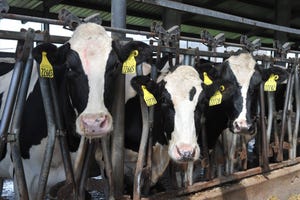Expert panel assesses new broiler farm undercover video
Video focuses on fast-growing genetics and disease.

The Center for Food Integrity's (CFI) Animal Care Review Panel this week examined a newly released undercover video by the animal rights group Compassion in World Farming (CWF) that alleged animal cruelty at West Virginia broiler farms contracted by Pilgrim’s Pride.The video was part of a report produced by CWF that was featured in a Nicholas Kristof column that ran last weekend in The New York Times.
The video footage included diseased chickens suffering from gangrenous dermatitis but also showed chickens with skeletal issues that the farmers said are related to fast-growing genetics. The video was taken by the farmers with cameras supplied by CWF, which then produced a video report that was posted online. The group declined to make unedited video available to the CFI panel members.
The National Chicken Council requested that CFI convene the panel, with Pilgrim's Pride being supportive of an independent, third-party review of the video.
CFI created the Animal Care Review Panel program to engage recognized animal care specialists to examine video and provide expert perspectives for food retailers, the livestock and poultry industry and the media.
The expert panel in this case was comprised of Dr. Patricia Hester with Purdue University, Dr. Sacit Bilgili with Auburn University and Dr. Bruce Webster with the University of Georgia. The three experts viewed the video and provided feedback independently and were given the opportunity to review each other's assessments before the report was finalized.
After review, Hester said the farms needed to implement a twice-daily bird health monitoring program that includes culling and euthanasia of any chicken of any age that is suffering and in distress, including the humane euthanasia of young chicks and older chickens with severe leg problems.
“It is obvious from the video that the farmers did not implement a rigorous culling program as there were older chickens in the flock that had been retained with severe leg problems. These lame chickens should have been humanely euthanized weeks earlier, yet the farmers allowed them to continue their suffering,” Hester noted.
She added that the National Chicken Council’s welfare guidelines explicitly state that chickens with “stunted growth and obvious gait defects that limit an individual bird’s ability to move about or access feed and water for normal growth and development are humanely euthanized.”
Webster said the farmers needed to slow down as they walked through their houses. Additionally, he said one of the factors that might contribute to gangrenous dermatitis is the scratching that occurs as the birds get excited and step on each other.
“I don’t know anything about the lighting program used on these farms, but typically, you would keep the lights low in order to keep the birds calm. If you have the lights turned up as you walk through a barn, as was seen in this video, the birds aren’t going to remain calm,” he said.
Webster also said better-quality litter might reduce the leg problems.
“On the inside, the litter (an organic material such as wood chips covering the floor) didn’t appear to be in very good condition. There appeared to be quite a bit of caking,” he said. “You couldn’t see a whole lot in the video, so it’s difficult to draw any broad conclusions.”
Hester mentioned that the litter looked like it had been recycled, explaining, “Given the disease problems they were having, they need to remove the old litter and refresh with new, unused litter.”
In response to the video, Biligli said, “The diseases (dermatitis and enteritis) as well as the skeletal issues mentioned in this video are not new to the industry. Health and management programs are designed to control these problems at all levels, as they cost money to the companies.”
Biligli said companies utilize farm supervisors to interact with the farmers almost weekly to implement these programs and to reduce flock morbidity and mortality. “Better communication between the company, technical personnel and the farmers should help a lot in this respect,” he added.
For the full CFI panel review report, click here.
Pilgrim’s Pride said in a statement that it holds a fundamental belief that healthy birds result in high-quality chicken products. “Each day, thousands of family farmers across the country work hard to produce healthy chickens. Death loss can occur on farms, but this is rarely due to animal cruelty, as there is no economic or ethical incentive to purposely harm animals,” the company said.
Pilgrim’s Pride added that it trains its contract growers annually on animal welfare. Additionally, company technicians and veterinarians work alongside growers to ensure that production practices promote animal well-being and result in healthy, wholesome products. “No incident cited in recent media reports has impacted food safety or human health,” the company said.
“Our commitment to the quality and safety of our products and the humane treatment of the animals under our care remains unfettered,” Pilgrim’s Pride said. “We look forward to working with our growers to continue to produce the high-quality products consumers have come to expect and enjoy from Pilgrim’s.”
About the Author(s)
You May Also Like



